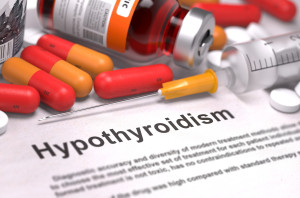The 4 Types of Thyroid Hormone Medications and How They Work
Thyroid hormone medications come in different types with lots of confusion and controversy between them. Here we will outline a general overview of the four types of thyroid medications and the functions of each medication.
How are Thyroid Hormone Medications Produced?

There are two ways in which thyroid hormone medications is produced. The first is done using synthetic components where the thyroid hormone medication is not natural, but a hormone replacement drug is produced in a lab. Leoxyl, Synthroid, Levothroid, Thyrolar and Cytomel are all synthetically produced thyroid hormone.
The second method is through extraction of thyroid hormone from animals. This is called non-synthetic thyroid hormone or simply, natural thyroid hormone. The only natural thyroid hormone derived from domesticated animals (i.e. bovine or porcine) is the desiccated thyroid.
Most physicians prefer that synthetic version of thyroid medication since the dosing for each pill is more consistent. However, many patients claims to have better results with natural thyroid hormone.
Different Types of Thyroid Hormone Medications and How They Work
Our body requires two types of thyroid hormones in order to function normally – the triiodothyronine (T3) and thyroxine (T4). Some medications contains only T3 or T4, while other have both.
Synthetic T4 Only
Synthetic T4 supplements are available in different brands:
- Synthroid (Levothyroxine)
- Unithroid (Levothyroxine)
- Levoxyl (Levothyroxine)
- Levothroid (Levothyroxine)
In general, synthetic forms of T4 are called levothyroxine and are considered the standard treatment for hypothyroidism. Though synthetically made, they are exactly the same as the thyroxine released by the thyroid gland.
Among the four, Synthroid is the most commonly prescribed brand because it provides a steady, prolonged effect of T4. However, all approved brand of T4 are bioequivalent which means there is no huge difference in their composition.
But this does not mean that all brands are completely the same. That is why the American Association of Clinical Endocrinologist believe that once you started using a certain brand, better stick to it. Changing brand may also change the dose, which could change how you feel.
Synthetic T3 Only
- Cytomel (liothyronine)
Most of the actions of the thyroid hormone are due to T3 but most T3 in the body are derived from the conversion of T4. T3 has very short life span while the T4 lasts much longer, so it is important to ensure a steady supply of T3 in the body. After taking Cytomel, T3 level is high but only for a short time, and then the level drops very rapidly.
This means that the patient must take T3 several times a day to ensure steady supply of T3. The problem with taking T3 is that this doesn’t maintain T3 levels evenly. There are times when T3 level is too high, causing unpleasant symptoms such as anxiety, insomnia and rapid heartbeat.
Another issue of T3 treatment is that the body cannot adjust converting T4 to T3 to modulate T3 supply based on your body’s needs. Hence, there is no indication to use T3 alone for the treatment of hypothyroidism.
Synthetic T3 and T4
- Thyrolar (liotrix)
- Combined Liothyronine/Levothyroxine
This combined preparation contains more T3 than what the body naturally produce. Because of this, it can have the same side effects as Cytomel (T3-alone). Thyrolar is also given once a day, which ignores the short life span of T3.
Compounded synthetic liothyronine/levothyroxine can be customized, allowing doctors to change the dosage to even the smallest ration based upon the patient’s response. The best part about compounded thyroid hormone is that both T4 and T3 are packed in a single capsule.
Natural T3 & T4
- Armour
Desiccated animal thyroid, now commonly derived from pigs, was the most common form of thyroid hormone therapy before synthetic versions were discovered. Now, it is still available as a prescription. Because drugs produced from animal thyroid are not purified, they may contain protein and hormones that are not ‘natural’ for the human body.
Though desiccated thyroid contains both T3 and T4, the amount of T3 and T4 in animals isn’t the same as in humans. Also, the amount and balance of T3 and T4 in desiccated thyroid vary a lot, making it difficult to keep blood levels right.
Do You Need Help?
Hormone Therapeutics is the leading national company assisting men who want to get their lives back through Hormone Replacement and Testosterone Replacement therapy. Our local physicians are ready to treat you anywhere in the entire country. Hormone Therapeutics is pioneering an easier, cost efficient and more private way for you to work with our clinical advisors and physicians from the privacy of your home or office after your local physical exam confirms you have one of the symptoms of Low T.
Contact us today and our clinical advisors will work with you on a hormone therapy program that may include prescribed hormones, exercise, nutrition and sleep programs to reclaim your vitality.
The 4 Types of Thyroid Hormone Medications and How They Work
Saleamp Design March 25th, 2016
Posted In: Health & Wellness
Tags: cytomel, desiccated thyroid, hormone replacement, Levothroid, Levoxyl, Synthroid, T3, T4, thyroid hormone, thyroid hormone medication, thyroid hormone replacement, thyroid medication, thyrolar, TSH, Unithroid


